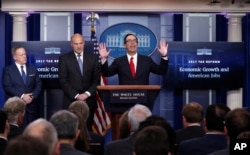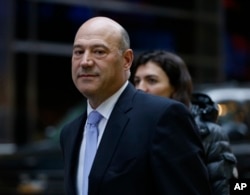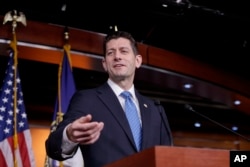President Donald Trump called Wednesday for a dramatic cut in U.S. corporate taxes to boost job growth in the world's largest economy and massive reforms in the country's complex tax code that could affect millions of American taxpayers.
Trump proposed cutting the U.S. corporate tax rate, the highest among the world's industrialized nations, from 35 to 15 percent. He also called for the one-time repatriation of profits earned by American companies from their overseas operations, a measure Treasury Secretary Steven Mnuchin said would bring back “trillions of dollars” to the U.S. that could be invested in business expansion at home.
“Job creation and economic growth is the top priority,” said chief White House economic adviser Gary Cohn, a one-time Wall Street financier. “Our basic premise here is to simplify the tax system, lower rates and make it easy. We don't want to penalize people. We want to make the system very fair. We are trying to stimulate business investment.”
Mnuchin called the proposal “the biggest tax cut” in U.S. history.
Plan could add to long-term debt
Trump, however, offered no immediate plan to pay for the tax cuts, which some independent economic analysts say that over next decade could add $2 trillion to the nearly $20 trillion in long-term debt the U.S. has already amassed.
Mnuchin said the expectation is that the corporate and individual tax cuts will boost U.S. economic growth to 3 percent annually, up from last year's tepid 1.6 percent advance. The U.S. economy, however, has not grown by 3 percent since 2005.
“This will pay for itself with growth and with reduction of different deductions and closing loopholes,” Mnuchin said, brushing aside assessments that the tax cuts would add to the cumulative U.S. debt, not reduce it.
Trump's proposal is likely to set off months of debate in Congress over the labyrinth U.S. tax code, where some of Trump's Republican colleagues already have voiced concerns about the cost of the plan.
’This isn’t going to be easy’
Cohn said he expects a long fight over the measure.
“This isn't going to be easy,” Cohn said. “Doing big things never is. We'll be attacked from the left and we'll attacked from the right. But one thing is certain. I would never, ever bet against this president. He will get this done for the American people.”
Mnuchin added, “We are determined to move this as fast as possible, to get this done this year.”
But Mark Hamrick, a senior economic analyst for Bankrate.com, voiced skepticism about the plan's eventual fate in Congress.
“I hesitate to call it a plan,” Hamrick told VOA. “It's really more of a wish list. It's very much focused on the traditional notion that if the wealthy and business do well, that will help everyone else in society and I think that's a suspect notion.”
Only three tax rate levels
Mnuchin said no tax rate has been set yet on the repatriated money earned by U.S. companies overseas, but that he is working with lawmakers to determine what it should be.
“It will be a very competitive rate that would bring back trillions of dollars,” Mnuchin said.
The two Trump advisers said that the top individual tax rate for U.S. taxpayers would be cut from 39.6 percent to 35 percent, with only two other tax rates, 10 percent and 25 percent, down from the current seven rate levels.
They said Trump wants to have a zero tax rate on the first $24,000 that workers earn each year, eliminate an alternative minimum tax rate that sometimes has added hefty sums to tax bills and abolish the country's inheritance tax on wealthy taxpayers. Many tax deductions that some individuals use to cut their tax bills would be eliminated, leaving only those for charitable giving, retirement savings plans and interest on home purchase loans.
Trump still won’t release tax returns
Opposition Democratic lawmakers in Congress have called on Trump, a billionaire real estate mogul turned Republican politician, to release his federal tax returns so they can determine how much he might benefit from his own tax proposals. But Mnuchin said Trump “has no intention” of disclosing the information, a stance the president has taken for months while campaigning for the White House.
Trump often attacked his predecessor, former President Barack Obama, for massive annual deficit spending that added to the national debt, something his tax plan might do as well. Cohn said Trump is still concerned about the debt but the adviser reiterated his view that the tax cuts would advance the economy.
Ryan offers support
Trump gained one quick ally for the coming legislative fight over U.S. tax policy. The leader of the Republican-controlled House of Representatives, Speaker Paul Ryan, voiced support for much of the president's proposal.
“We like it a lot, it puts us on the same page, we're in agreement on 80 percent, and on the 20 percent we're in the same ballpark,” said Ryan.
Tax experts say the 35 percent U.S. corporate tax rate is the highest among the world's 35 industrialized nations, although U.S. corporations rarely pay that much because they are permitted to deduct their business expenses from their revenues before. A number of profitable companies pay no U.S. income taxes.







